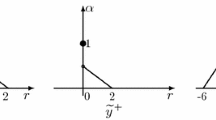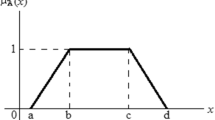Abstract
In this paper, a Mond-Weir type dual program for a nonlinear primal problem under fuzzy environment is formulated. The solution concept of primal-dual problems is inspired by the nondominated solution. We have considered ordering among fuzzy numbers as a partial ordering and using the concept of Hukuhara difference between two fuzzy numbers and \(H\)-differentiability, appropriate duality theorems are established under pseudo/quasi-convexity assumptions. We have also illustrated a numerical example which satisfies the duality relations discussed in the paper.
Similar content being viewed by others
References
Amiri, N. M., & Nasseri, S. H. (2006). Duality in fuzzy number linear programming by use of a certain linear ranking function. Applied Mathematics and Computation, 180, 206–216.
Amiri, N. M., & Nasseri, S. H. (2007). Duality results and a dual simplex method for linear programming problems with trapezoidal fuzzy variables. Fuzzy Sets and Systems, 158, 1961–1978.
Banks, H. T., & Jacobs, M. Q. (1970). A differential calculus for multifunctions. Journal of Mathematical Analysis and Applications, 29, 246–272.
Bector, C. R., & Chandra, S. (2005). Fuzzy mathematical programming and fuzzy matrix games (pp. 42–44). Berlin, Heidelberg: Springer.
Bector, C. R., & Chandra, S. (2002). On duality in linear programming under fuzzy environment. Fuzzy Sets and Systems, 125, 317–325.
Bellman, R. E., & Zadeh, L. A. (1970). Decision making in a fuzzy environment. Management Science, 17, 141–164.
Carlsson, C., & Korhonen, P. (1986). A parametric approach to fuzzy linear programming. Fuzzy Sets and Systems, 20, 17–30.
Fang, S.-C., Hu, C.-F., Wang, H.-F., & Wu, S.-Y. (1999). Linear programming with fuzzy coefficients in constraints. Computers and Mathematics with Applications, 37, 63–76.
Gasimov, R. N., & Yenilmez, K. (2002). Solving fuzzy linear programming problems with linear membership functions. Turkish Journal of Mathematics, 26, 375–396.
Gupta, P., & Mehlawat, M. K. (2009). Bector-Chandra type duality in fuzzy linear programming with exponential membership functions. Fuzzy Sets and Systems, 160, 3290–3308.
Hamacher, H., Leberling, H., & Zimmermann, H.-J. (1978). Sensitivity analysis in fuzzy linear programming. Fuzzy Sets and Systems, 1, 269–281.
Inuiguchi, M., Ramik, J., Tanino, T., & Vlach, M. (2003). Satisfying solutions and duality in interval and fuzzy linear programming. Fuzzy Sets and Systems, 135, 151–177.
Kabbara, G. (1982). New utilization of fuzzy optimization method. In M. M. Gupta, & E. Sanchez (Ed.), Fuzzy information and decision processes (pp. 239–246). North-Holland: Amsterdam.
Liu, Y. J., Shi, Y., & Liu, Y. H. (1995). Duality of fuzzy \({MC}^2\) linear programming: A constructive approach. Journal of Mathematical Analysis and Applications, 194, 389–413.
Negoita, C. V. (1970). Fuzzyness in management. Miamil: OPSA/TIMS.
Ovchinnikov, S. (1991). The duality principle in fuzzy set theory. Fuzzy Sets and Systems, 42, 133–144.
Ramik, J. (2005). Duality in fuzzy linear programming: Some new concepts and results. Fuzzy Optimization and Decision Making, 4, 25–39.
Ramik, J. (2006). Duality in fuzzy linear programming with possibility and necessity relations. Fuzzy Sets and Systems, 157, 1283–1302.
Rodder, W., & Zimmermann, H. J. (1977). Duality in fuzzy linear programming. In Proceedings, A. V., Fiacco, & K. O., Kortanek (Eds.) International symposium on extremal methods and systems analysis (pp. 415–427). Heidelberg, New York: University of Texas at Austin Berlin (1980).
Tanaka, H., & Asai, K. (1984). Fuzzy linear programming problems with fuzzy numbers. Fuzzy Sets and Systems, 13, 1–10.
Verdegay, J. L. (1984). A dual approach to solve the fuzzy linear programming problems. Fuzzy Sets and Systems, 14, 131–141.
Vijay, V., Chandra, S., & Bector, C. R. (2004). Duality in linear programming with fuzzy parameters and matrix games with fuzzy pay-offs. Fuzzy Sets and Systems, 146, 253–269.
Wu, H.-C. (2003). Duality theory in fuzzy linear programming problems with fuzzy coefficients. Fuzzy Optimization and Decision Making, 2, 61–73.
Wu, H.-C. (2004). Duality theory in fuzzy optimization problems. Fuzzy Optimization and Decision Making, 3, 345–365.
Wu, H.-C. (2007). Duality theory in fuzzy optimization problems formulated by the Wolfe’s primal and dual pair. Fuzzy Optimization and Decision Making, 6, 179–198.
Wu, H.-C. (2009). The optimality conditions for optimization problems with convex constraints and multiple fuzzy-valued objective functions. Fuzzy Optimization and Decision Making, 8, 295–321.
Zadeh, L. A. (1965). Fuzzy sets. Information Control, 8, 338–353.
Zhang, C., Yuan, X.-H., & Lee, E. S. (2005). Duality theory in fuzzy mathematical programming problems with fuzzy coefficients. Computers and Mathematics with Applications, 49, 1709–1730.
Zimmermann, H.-J. (1978). Fuzzy programming and linear programming with serveral objective functions. Fuzzy Sets and Systems, 1, 45–55.
Acknowledgments
The authors are thankful to the anonymous referee for his/her valuable suggestions and critical comments, which have substantially improved the presentation of the paper. Also, the second author is thankful to Ministry of Human Resource development, New Delhi (India) for financial support.
Author information
Authors and Affiliations
Corresponding author
Rights and permissions
About this article
Cite this article
Gupta, S.K., Dangar, D. Duality for a class of fuzzy nonlinear optimization problem under generalized convexity. Fuzzy Optim Decis Making 13, 131–150 (2014). https://doi.org/10.1007/s10700-013-9176-7
Published:
Issue Date:
DOI: https://doi.org/10.1007/s10700-013-9176-7




